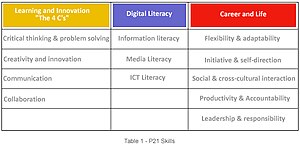
Back مهارات القرن الحادي والعشرين Arabic একবিংশ শতাব্দীর দক্ষতা Bengali/Bangla Dovednosti pro 21. století Czech Habilidades del siglo XXI Spanish مهارتهای قرن بیست و یکم Persian מיומנויות המאה ה-21 HE २१वीं शताब्दी के कौशल Hindi 21. aldar færni Icelandic 21世紀型スキル Japanese 21ನೇ ಶತಮಾನದ ಕೌಶಲ್ಯಗಳು Kannada
This article is written like a personal reflection, personal essay, or argumentative essay that states a Wikipedia editor's personal feelings or presents an original argument about a topic. (May 2020) |


21st century skills comprise skills, abilities, and learning dispositions identified as requirements for success in 21st century society and workplaces by educators, business leaders, academics, and governmental agencies. This is part of an international movement focusing on the skills required for students to prepare for workplace success in a rapidly changing, digital society. Many of these skills are associated with deeper learning, which is based on mastering skills such as analytic reasoning, complex problem solving, and teamwork, which differ from traditional academic skills as these are not content knowledge-based.[1][2][3][4]
During the latter decades of the 20th century and into the 21st century, society evolved through technology advancements at an accelerated pace, impacting economy and the workplace, which impacted the educational system preparing students for the workforce. Beginning in the 1980s, government, educators, and major employers issued a series of reports identifying key skills and implementation strategies to steer students and workers towards meeting these changing societal and workplace demands.
Western economies transformed from industrial-based to service-based, with trades and vocations having smaller roles.[5] However, specific hard skills and mastery of particular skill sets, with a focus on digital literacy, are in increasingly high demand.[1][2] People skills that involve interaction, collaboration, and managing others are increasingly important.[6] Skills that enable flexibility and adaptability in different roles and fields, those that involve processing information and managing people more than manipulating equipment—in an office or a factory—are in greater demand.[7] These are also referred to as "applied skills" or "soft skills",[8] including personal, interpersonal, or learning-based skills, such as life skills (problem-solving behaviors), people skills, and social skills. The skills have been grouped into three main areas:[9]
- Learning and innovation skills: critical thinking and problem solving, communications and collaboration, creativity and innovation
- Digital literacy skills: information literacy, media literacy, Information and communication technologies (ICT) literacy
- Career and life skills: flexibility and adaptability, initiative and self-direction, social and cross-cultural interaction, productivity and accountability
Many of these skills are also identified as key qualities of progressive education, a pedagogical movement that began in the late nineteenth century and continues in various forms to the present.
- ^ a b Chris Dede, Comparing Frameworks for 21st Century Skills, Harvard Graduate School of Education, 2009. Retrieved 2016-03-09
- ^ a b Stedman Graham, Preparing for the 21st Century: Soft Skills Matter, Huffington Post, April 26, 2015. Retrieved 2016-03-16
- ^ Larry Cuban, Content vs. skills in high schools – 21st century arguments echo 19th century conflicts, November 3, 2015. Retrieved 2016-03-12
- ^ Manalo, Emmanuel (2019-09-12). Deeper Learning, Dialogic Learning, and Critical Thinking. doi:10.4324/9780429323058. ISBN 9780429323058. S2CID 203059828.
- ^ Futurework – Trends and Challenges for work in the 21st century, US Department of Labor report, Chapter 4 Archived 2016-03-13 at the Wayback Machine. Retrieved 2016-03-12
- ^ Cite error: The named reference
OECDwas invoked but never defined (see the help page). - ^ 21st-century-workplaces Attitudinal Skills for 21st century workplaces, Arbora Archived 2019-07-09 at the Wayback Machine. Retrieved 2016-03-12
- ^ "Soft Skills" in Big Demand, Education Week, March 8, 2016. Retrieved 2016-03-09
- ^ Trilling, Bernie and Fadel, Charles: 21st Century Skills: Learning for Life in Our Times, Jossey-Bass (publisher), 2009. ISBN 978-0-470-55362-6. Retrieved 2016-03-13